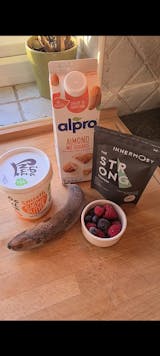When it comes to unsubstantiated myths about protein, we’ve heard them all. There are all kinds of crazy stories out there, and sometimes it can be difficult to separate fact from fiction. We’ve examined the five most common myths about protein out there, and we’re confident that you’re going to be very happy with our findings and will be able to stop worrying about protein once and for all.
Myth #1. Protein will make me bulky
This is the daddy of all myths about protein, and it’s one that we can conclusively stamp on. We can assure you that none of Innermost’s high-protein, low-fat, low-sugar and low-carbohydrate blends will not make you bulky. In fact, they help to have exactly the opposite effect. A diet that’s low in fat and carbs and high in protein assists in toning and defining your body, helping to make muscles more visible and helping you to stay lean.
While it’s true that many people consume protein with the goal of increasing their muscle mass and their size, this approach only has any effect when it’s used in combination with lifting weights with the primary goal of bulking up, as well as consuming a high-calorie diet across the board. If you follow a balanced diet, take the right supplements (check out Innermost’s incredible supplements here) and have a workout routine tailored to your goals, we promise that you won’t balloon up into The Rock overnight.
Myth #2. The more protein you eat, the more muscle you’ll develop
It’s true that protein is the building block of all cells in your body, and is incredibly important in the muscle repair and rebuilding process. However, it doesn’t follow that the simple act of consuming more protein will automatically lead to muscle growth. Think about it - do your bones grow longer when you consume lots of calcium? No. And there’s no biological reason why your muscles would behave in this way either.
To increase your muscle mass, you need to be following a workout and diet plan which is designed to bulk you up and increase your body mass. If anything, you should be focusing on this more and more as you get older, rather than less, as this is when it becomes harder for the body to hold on to and build muscle.
Myth #3. Cooking protein means it loses its benefits
Thankfully for us all, we’re not cavemen who are forced to chow down on nothing but raw meat and berries for lack of a way to cook our food. Assuming you’re not scorching all of your food to the point that it stops being edible and turns into charcoal, there is no risk of your protein losing the benefits it provides by being cooked. This goes for all forms of cooking and all forms of protein, so bake, fry and steam away. Helpfully, this opens up the wide world of the incredible possibilities of Innermost protein powder. Expand your worldview beyond that of a smoothie and try making protein pancakes, cookies, muffins and more.
In fact, cooking foods such as meat and vegetables can help to make the nutrients they contain more easily digestible, by breaking down some of the fibres and cell walls of the foods. And of course cooking also makes food more delicious, making it far more enjoyable to eat than a plain old bowl of raw tofu.
Myth #4. All protein is created equal
All protein is made up of amino acids, but not all sources of protein contain the essential amino acids your body needs to support cell and muscle health. Whilst whey protein is a complete source of essential amino acids, many plant proteins are not. That’s why it’s important to combine multiple plant-based protein sources when you’re sourcing the most complete protein for your needs - as we have done in The Health Protein.
Additionally, the most important amino acid is leucine, which is responsible for switching on the protein absorption process. You need around 3g per serving for it to do its job, which just so happens to be the amount we’ve packed into each of our protein blends. Convenient, eh?
Myth #5. Protein will cause your kidneys to shut down
This myth is simply untrue. Yes, if you were consuming a full gallon drum’s worth of protein shakes every single day, it might be time to start thinking about making an appointment with a dialysis machine. Otherwise, however, your kidneys are going to be just fine.
If you’re concerned about your kidney health, the most effective way to support your body in this arena is to ensure you’re drinking plenty of water. By staying hydrated, you’ll be giving your kidneys the best chance possible of staying in tip-top condition. This goes double if you’re working out, have been feeling dehydrated lately or are planning a big night out on the tiles (which case, check out tips on the best hangover cures so you don’t end up feeling rotten the next day).























